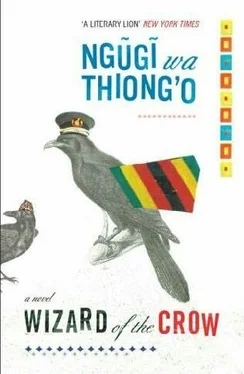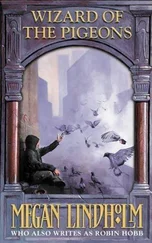“Is he the only doctor who has seen him? No other doctor?”
“Yes.”
“Fine with me.”
“That’s wise. There is no point wasting time talking to too many people. Time is of the essence. Consult your mirror and…”
“Take the next flight home,” the Wizard of the Crow completed
Machokali’s thought. “Believe me, Mr. Minister, I am not keen on staying in America a minute longer than necessary. I prefer the bush and its healing properties. My procedure will be quick or slow depending on whether or not those who have had dealings with the patient are telling all they know.”
“Would a government minister lie to you?” Machokali said, offended.
“Are you now telling me the truth?” the Wizard of the Crow asked him offhandedly, continuing to fumble with his tie.
“Don’t flay with me, Sorcerer Kagogo,” Machokali said angrily in Kiswahili. “Why would I lie to you? I don’t want anything from you. I am not the patient here.”
“Excuse me, but please come over here,” the Wizard of the Crow said, beckoning him with a finger.
Machokali was not happy with the sorcerer giving him orders, but to speed up matters he toned down his own antagonism and did as asked.
“Please look in the mirror,” the Wizard of the Crow requested, stepping aside to give him ample room.
Machokali did so as the Wizard of the Crow looked at the palm of his own right hand.
“What do you see?” the wizard asked Machokali.
“My reflection,” Machokali said. “And yours standing there staring into your hand.”
“Focus on your own reflection. Look at it carefully.”
“So?”
“If you look hard at yourself you will see what I am seeing. I will ask you again. Is Kaboca the Ruler’s only doctor?”
“And I will answer you again: why would I lie to you?”
“Keep looking at the mirror,” said the Wizard of the Crow. “What do you see? Do you see something white, like the whiteness of white people? Two white figures?”
No matter how hard he tried, Machokali could not see any face other than his own. Where were the white figures the wizard was talking about?
“No. This is a charade,” he said, and looked away.
But the Wizard of the Crow continued to look intensely at his palm as if it were a handheld mirror.
“There, there they are,” the wizard said excitedly.
Machokali quickly turned his eyes to the mirror and stared feverishly. He saw nothing.
“There are two wearing stethoscopes. One walks like he comes from New York. Very confident in the streets. And the other? Where is he from?” he said, fixing his eyes on Machokali.
Machokali’s lips trembled. How did he know about Furyk and Clarkwell, and that they were from different places? Machokali had forgotten that last night he had left the Wizard of the Crow in A.G.’s company. He looked at the wizard and for a few seconds they sized each other up.
“Oh, those two,” Machokali said, not wanting to be caught in more lies. “It is strange, but really I never thought of them as doctors. I thought that you would not want to see Professor Din Furyk and Clement C. Clarkwell. I have heard it said that white science and black sorcery do not mix, that they are like night and day. Are you sure that you want to talk to them as well?”
The Wizard of the Crow indicated with a gesture that the two of them should now sit down for an additional chat.
“Mr. Minister. When I said that I wanted to talk to everyone who has had some contact with the patient, I meant what I said,” explained the Wizard of the Crow.
“How do you want me to introduce you?”
“Tell them the truth.”
“That you are a sorcerer?”
“That I am a healer. An African healer. That I trap the bad to save the good.”
“Okay Leave that to me,” Machokali said. “Whom would you like to talk to first?”
“You!”
“What do you want to know?”
“How it all began.”
If Machokali’s affairs had begun to take the wrong turn when he failed to secure a state visit for the Ruler, they had worsened after the delegation’s arrival in America. He tried to ameliorate the failure by appealing to his American friends to influence the president to receive the Ruler of Aburlria, even for fifteen minutes. But apparently the American president was fully booked.
As for the vice president, the secretary of state, senators, and right down to congressmen, the results were similar. Finally, through much furious lobbying, a prayer breakfast with the president was secured.
The Ruler was very glad to hear that he and the American president were going to have a prayer breakfast, his only regret being that he had forgotten to include a cleric in his delegation to put in a word of prayer for Aburlria. The Ruler chartered a plane to Washington, where he and his entourage were met by the Aburlrian ambassador and his deputy, Yunice Immaculate Mgenzi, who addressed the Ruler as if she were the real ambassador. From there, in a fleet of limos, they headed toward the place of prayer.
Machokali was beginning to feel his spirits rise when, as luck would have it, they arrived at the venue only to confront demonstrators carrying placards and chanting slogans all denouncing the Aburlrian dictator and his plans for Marching to Heaven. Who are these crazy fellows who dared to call themselves Friends of Democracy and Human Rights in Aburlria? Machokali wondered bitterly. He peeked through the window of the limo and recognized one of the demonstrators, perhaps even its mastermind, Materu, former professor of history at the University of Aburlria, who earlier had been released after serving ten of ten and half years of hard labor in the country’s maximum-security prison for writing about the independence of Aburlria and failing to mention that the Ruler had been a freedom fighter. And this professor had yet to thank the Ruler for giving him back six whole months of his life. Machokali’s anger deepened as he watched the arrogant bearded professor strutting about in a foreign land, betraying his country and Ruler and spoiling the good feelings about the coming breakfast.
He was relieved that the Ruler did not ask him about the demonstration. But bad luck continued to stalk him; as soon as they entered the reception area and the Ruler realized that he was only one among thousands who had paid thousands of dollars a plate, he looked menacingly at Machokali as if to ask, What’s all this about? Will I not be able to shake hands with the president and sit next to him?
Machokali had assumed that the Ruler had all along understood that the occasion was to raise money for the American president’s charities. It was obvious that a misunderstanding had occurred; the prayer breakfast had turned into a disaster, a further blow to Machokali s prestige in the eyes of the Ruler.
He did not give up; he made strenuous efforts to mollify his wounded pride by trying to get the Ruler on such television shows as Global Luminaries & Visionaries and Meet the Global Mighty, which were then very popular among foreign politicians because they gave them a chance to make their cases directly to the American people while addressing a global audience. But the producers had shown no interest in the Ruler.
So the only opening was an address before the General Assembly of the United Nations. But a mutually convenient date had proved problematic because the Ruler wanted to address the august body only after he had secured the loan for Marching to Heaven.
Those were troubling days for Machokali; nothing he did seemed to lift the cloud developing between him and the Ruler. Nothing seemed to work in his favor.
And then one day the Ruler invited the entire delegation to a luncheon in his special dining room. They had not eaten together with him for quite a while, and they were all struck by the celebratory atmosphere. There were flowers and champagne on the tables. What’s going on? Machokali asked himself; all the other ministers were asking the same question. But when they saw how the Ruler talked to them jovially, they concluded that something good had happened.
Читать дальше












